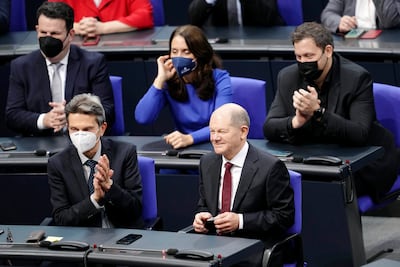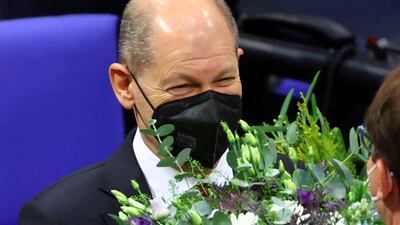Olaf Scholz was sworn in as Chancellor of Germany on Wednesday, bringing the curtain down on Angela Merkel's 16-year term at the helm of Europe's biggest economy.
Watching from the public gallery in parliament, Mrs Merkel was given a standing ovation by MPs before they voted to confirm Mr Scholz's appointment.
Mr Scholz, 63, won the vote by 395 to 303, winning the required majority in the 736-seat parliament and clearing the final hurdle for his three-party coalition.
He takes power with a mission to modernise Germany but faces the immediate challenges of the coronavirus pandemic and the Russian troop build-up on Ukraine's eastern flank.
The Ukraine crisis occupied Mrs Merkel until her final hours in office, with Berlin under pressure from Washington over the controversial Nord Stream 2 gas pipeline to Russia.
She was briefed by US President Joe Biden on Tuesday after his call with Russian counterpart Vladimir Putin, amid fears the Kremlin is planning to invade its former Soviet neighbour.
“It must be quite, quite clear that it would be an unacceptable situation if there were a threat to Ukraine,” Mr Scholz said.
The new chancellor said his first foreign trip would be to Paris, where French President Emmanuel Macron welcomed his appointment with a call to “write the next chapter together".
Global leaders, including those of the UAE, sent congratulatory messages to Berlin. The President, Sheikh Khalifa, sent a cable to Mr Scholz with his congratulations while Sheikh Mohammed bin Rashid, Vice President and Ruler of Dubai, and Sheikh Mohamed bin Zayed, Crown Prince of Abu Dhabi and Deputy Supreme Commander of the Armed Forces, sent similar messages.
Mr Biden extended his "congratulations" to Mr Scholz and "is looking forward to building on the strong ties between our two nations," White House spokeswoman Karine Jean-Pierre said.
Moscow said it was hoping for constructive relations with Mr Scholz, with Kremlin spokesman Dmitry Peskov saying there was “no alternative to dialogue".
After taking the oath of office and moving into the chancellery in Berlin, Mr Scholz said he would strive for “a new beginning for our country” but described the pandemic as a “great, unfinished crisis".
“It’s a great challenge and I’m very grateful that the people and parliament of this country have given me this task,” he said of his new role.

The new Cabinet, with Russia critic Annalena Baerbock as foreign minister, was sworn in at a ceremony with Germany's president.
Mr Scholz, a Social Democrat, is the ninth postwar chancellor and the fourth in the reunified Germany.
A former mayor of Hamburg, he led the party to victory after years as a junior partner to Ms Merkel's Christian Democrats (CDU), in a “grand coalition” in which Mr Scholz was finance minister.
After winning September's election, he sealed a coalition deal with the Greens and Free Democrats (FDP), the first such alliance at national level.
Armin Laschet, the defeated CDU candidate at the election, was among the first to congratulate Mr Scholz in parliament.
“Although we fought for a different result, we can be happy that there is such respect among democrats in our country,” he said.
The coalition parties plan to slash Germany's carbon emissions, overhaul its creaking digital infrastructure, modernise citizenship laws, raise the minimum wage and speed up the building of new homes.
Green co-leader Robert Habeck will take on an expanded economy and climate ministry to lead the race to net zero, while FDP chief Christian Lindner is the new finance minister.
Their four-year programme to revamp Germany is called “Dare More Progress”, a hat tip to Cold War-era chancellor Willy Brandt and his pledge to “Dare More Democracy".
Before taking office, the coalition partners used their new majority to amend Germany's coronavirus laws, tightening restrictions on public transport and in workplaces.
They were criticised by the Christian Democrats, who are going into opposition, for allowing a state of emergency to expire despite a surge in infections leading up to winter.
Mr Scholz wants 30 million Germans to be vaccinated, or given a booster, by the end of the year amid frustration over the number of unprotected people.
He expressed support for a nationwide vaccine mandate, an issue to be debated by parliament in the new year.


